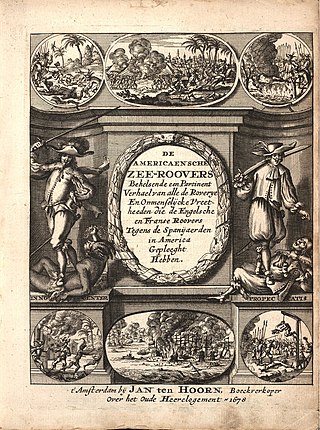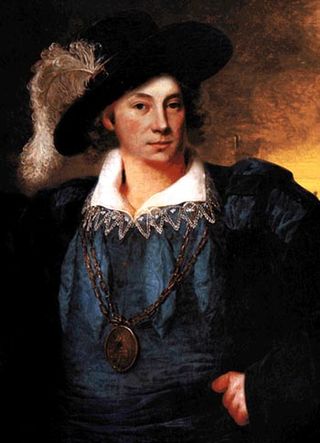
Buccaneers were a kind of privateer or free sailors particular to the Caribbean Sea during the 17th and 18th centuries. First established on northern Hispaniola as early as 1625, their heyday was from the Restoration in 1660 until about 1688, during a time when governments in the Caribbean area were not strong enough to suppress them.

Alexandre Olivier Exquemelin was a French, Dutch, or Flemish writer best known as the author of one of the most important sourcebooks of 17th-century piracy, first published in Dutch as De Americaensche Zee-Roovers, in Amsterdam, by Jan ten Hoorn, in 1678.

During the Spanish colonization of the Americas, the Spanish Main was the collective term for the parts of the Spanish Empire that were on the mainland of the Americas and had coastlines on the Caribbean Sea or Gulf of Mexico. The term was used to distinguish those regions from the numerous islands Spain controlled in the Caribbean, which were known as the Spanish West Indies.
William Wright was an English privateer in French service and later buccaneer who raided Spanish towns in the late 17th century.
This timeline of the history of piracy in the 1680s is a chronological list of key events involving pirates between 1680 and 1689.

Robert Searle was one of the earliest and most active of the English buccaneers on Jamaica.

Michel de Grammont was a French privateer. He was born in Paris, France and was lost at sea in the north-east Caribbean, April 1686. His privateer career lasted from around 1670 to 1686 during which he commanded the flagship Hardi. He primarily attacked Spanish holdings in Maracaibo, Gibraltar, Trujillo, La Guaira, Puerto Cabello, Cumana and Veracruz.

Laurens Cornelis Boudewijn de Graaf was a Dutch pirate, mercenary, and naval officer in the service of the French colony of Saint-Domingue during the late 17th and early 18th century.

Edward Davis or Davies was an English buccaneer active in the Caribbean during the 1680s and would lead successful raids against Leon and Panama in 1685, the latter considered one of the last major buccaneer raids against a Spanish stronghold. Much of his career was later recorded by writer William Dampier in A New Voyage Round the World (1697).

Pierre le Grand was a French buccaneer supposedly active during the 17th century. He is known to history from only one source, Alexandre Exquemelin's Buccaneers of America, and thus his historical existence has been questioned. The accounts that Exquemelin gives of Le Grand and another buccaneer named Pierre Francois are also remarkably similar. It is possible that Exquemelin, who was not an eye-witness to these events, was confused. Pierre le Grand could have been a nickname for Pierre Francois. However, there does seem to be at least one reference to Le Grand in historical records other than Exquemelin. C. H. Haring's well-researched 'The Buccaneers in the West Indies in the XVII Century' (1910), note 1 on page 135, refers to a Spanish report that credited Pierre Legrand with leading a raid against Spanish settlements in Cuba and Havana in 1665. English records, however, credit Edward Mansfield with leading these attacks.
Laurens Prins, anglicized as Lawrence Prince, was a 17th-century Dutch buccaneer, privateer and an officer under Captain Sir Henry Morgan. He and Major John Morris led one of the columns that raided Panama in 1671.

Edward Mansvelt or Mansfield was a 17th-century Dutch corsair and buccaneer who, at one time, was acknowledged as an informal chieftain of the "Brethren of the Coast". He was the first to organise large scale raids against Spanish settlements, tactics which would be utilised to attack Spanish strongholds by later buccaneers in future years, and held considerable influence in Tortuga and Port Royal. He was widely considered one of the finest buccaneers of his day and, following his death, his position was assumed by his protégé and vice-admiral, Henry Morgan.

Moïse Vauquelin or Moses Vanclein was a 17th-century French buccaneer. During his four-year career as a pirate, he served as an officer under l'Ollonais and formed a brief partnership with Pierre Le Picard. He and Philippe Bequel later co-wrote a book detailing their explorations of the Honduran and Yucatán coastline.

Pierre le Picard was a 17th-century French buccaneer. He was both an officer to l'Olonnais as well as Sir Henry Morgan, most notably taking part in his raids at Maracaibo and Panama, and may have been one of the first buccaneers to raid shipping on both the Caribbean and Pacific coasts.
The Miskito Sambu, also known simply as the Miskito, are an ethnic group of mixed cultural ancestry occupying a portion of the Caribbean coast of Central America known as the Mosquito Coast region. Although older records, beginning with Spanish documents of the early 18th century, refer to the group as "Mosquitos Zambos", modern ethnographic terminology uses the term Miskito.

"No purchase, no pay" was a phrase used by pirates and privateers, of the 17th century in particular, to describe the conditions under which participants were expected to join expeditions or raids. The phrase describes a remuneration arrangement similar to a commission.

The Sack of Campeche was a 1663 raid by pirates led by Christopher Myngs and Edward Mansvelt which became a model for later coastal pirate raids of the buccaneering era.

Alexandre Bras-de-Fer was a flibustier in the latter half of the mid-17th century. He is best known for capturing a Spanish ship after being shipwrecked, though his story is possibly apocryphal.
Thomas Magott was a minor pirate and privateer best known for joining a group of buccaneers in assaulting Spanish Puerto Bello.
Jean Bernanos was a French buccaneer, privateer, and pirate active in the Caribbean and across Spanish Central America.















